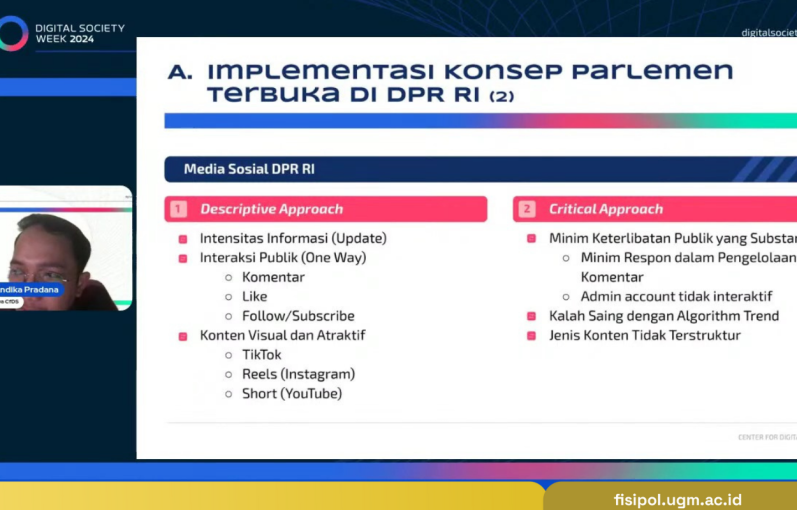
Yogyakarta, October 3rd 2024─The current political dynamics cannot be separated from the influence of technological developments, including Artificial Intelligence (AI). The Center for Digital Society (CfDS) raised this issue during the 3rd day of Digital Society Week 2024 on Thursday (3/9). Through four panel discussions, CfDS and several experts highlighted AI phenomena in politics and its potential to increase transparency and support democracy.
In the first panel titled “Indonesian Parliamentary Reform”, Doni Andika Pradana, CfDS Scholarship Awardee explained how AI can be used to increase public participation in parliament. So far, political processes such as the formation of parliaments and policies tend to be closed and far from the public’s view. Only a small portion of the public can understand how political dynamics work. Whereas the existence of parliament is basically intended to channel the needs and aspirations of the community.
“So far, people’s aspirations have been channeled bureaucratically. Maybe for civil organizations they are stronger because they are institutionalized, but for individual people it is so difficult to convey. Social media is currently open, but it does not guarantee that aspirations can be heard,” said Doni. The potential of AI in increasing public participation can be implemented in an interface system or interactive website. The system is not only expected to be able to provide services, but also to foster public political literacy.
However, the use of AI in parliamentary openness also faces many challenges. AI, which requires so much data, cannot guarantee security and responsibility in using the data. “Of course there are ethical challenges, because AI uses big data. Now, whether this big data can be used properly by its managers is a challenge,” added Doni. The same goes for the limited access to AI itself, where not all levels of society are able to access and operate the service.
In terms of increasing public participation, the challenge of AI in politics also arises in the 2024 election. CfDS research shows that AI can both strengthen and weaken public trust in elections. Social media and generative AI, for example, both proved capable of manipulating the public and spreading hoaxes in the 2024 elections. This impact can be seen especially in the younger generation. The three presidential and vice presidential candidates are aggressively utilizing social media to attract votes from the youth.
“All three candidates use social media and generative AI to communicate with young people. The impact is that they are quite influenced by this strategy,” said Karim. He added that young people have a broader context in terms of political participation. Unfortunately, the three candidates at that time failed to define what the position of the youth actually is. They generalized the entire Gen Z based on their behavior, and were only used as a vote distributor for candidates.
Challenges in AI also arise from the capabilities of AI itself. While AI is proven to simplify data processing, digital product creation, and even digital work efficiency, its capabilities remain limited. In panels three and four, it is explained how AI is still biased in defining gender and how the ethics and responsibility of using AI are still an issue. This problem can arise from two things, namely the data processed by AI is inherently biased, and the ability of AI to process data.
Digital Society Week 2024 by CfDS Fisipol UGM provides a forum for academics and society to discuss the influence of technology in people’s lives. The development of technology cannot be estimated, but the readiness of society to face it must continue to be pursued. This activity also supports the 4th Sustainable Development Goals, namely Quality Education.
